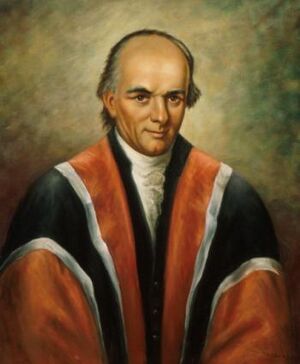Alfred Moore facts for kids
Quick facts for kids
Alfred Moore
|
|
|---|---|
 |
|
| Associate Justice of the Supreme Court of the United States | |
| In office April 21, 1800 – January 26, 1804 |
|
| Nominated by | John Adams |
| Preceded by | James Iredell |
| Succeeded by | William Johnson |
| Attorney General of North Carolina | |
| In office April 22, 1782 – January 9, 1791 |
|
| Governor | Alexander Martin Richard Caswell Samuel Johnston Alexander Martin |
| Preceded by | James Iredell |
| Succeeded by | John Haywood |
| Personal details | |
| Born | May 21, 1755 New Hanover County, North Carolina, British America |
| Died | October 15, 1810 (aged 55) Bladen County, North Carolina, U.S. |
| Political party | Federalist |
| Signature | |
Alfred Moore (born May 21, 1755 – died October 15, 1810) was an important American judge and lawyer. He also served as a military officer and managed a large farm. He became an associate justice on the highest court in the United States.
You might know his name from places in North Carolina. Moore Square, a park in Raleigh, and Moore County are both named after him. He also helped start the University of North Carolina at Chapel Hill.
Even though he was on the Supreme Court for almost four years, Alfred Moore wrote only one official opinion. This was for a case called Bas v. Tingy, which was about maritime law (rules for ships and the sea). He was often in poor health, which kept him from taking part in many court decisions. This included the very famous case of Marbury v. Madison.
Contents
Early Life and Education
Alfred Moore was born on May 21, 1755. His family lived in New Hanover County, North Carolina. His parents were Anne (Grange) and Maurice Moore. The Moore family was well-known in the area.
His great-grandfather, James Moore, was a governor of Carolina a long time ago. Alfred's father, Maurice, was also a judge. He wrote about how he disagreed with the Stamp Act, a British tax.
Around 1764, after his mother passed away, Alfred went to Boston to finish his schooling. Later, he came back to North Carolina. He studied law by learning from his father. In April 1775, he became a lawyer.
Fighting for Independence
When the American Revolutionary War began, Alfred Moore joined the fight. On September 1, 1775, he became a captain in the 1st North Carolina Regiment. His uncle, James Moore, was the colonel of this regiment.
Alfred Moore fought in the Battle of Moore's Creek Bridge. He also helped defend Charleston, South Carolina, when British forces tried to attack. On March 8, 1777, he left the army. This was because his father, brother, and uncle had all died. He needed to go home and take care of his family's large farm.
Even after leaving the army, he kept fighting the British and their supporters. When Lord Cornwallis and his troops moved through North Carolina, they attacked many American farms. British forces burned Moore's family farm and took his livestock and workers.
A Career in Law and Politics
After the war, Alfred Moore was chosen to be part of the North Carolina General Assembly. This group later elected him to be the Attorney General for the state. He held this important job from 1782 to 1791.
By 1790, his family's wealth had grown again. As Attorney General, he argued a big case in 1787 called Bayard v. Singleton. This case was important because it was an early example of judicial review. This means courts can decide if a law follows the rules of the constitution.
Moore strongly supported the Federalist Party. This party wanted a strong national government. He played a key role in getting North Carolina to agree to the United States Constitution. The state had first said no in 1788.
He also helped create the University of North Carolina at Chapel Hill. He was one of the people who chose where the university would be built. He served on its board of trustees from 1789 to 1807.
In 1792, Moore was elected to the state House of Representatives again. He served one term. He tried to become a U.S. Senator in 1794 and 1798 but did not win. In 1798, he was elected to be a judge on the North Carolina Superior Court.
Serving on the Highest Court
On December 4, 1799, President John Adams chose Alfred Moore to be an associate justice of the United States Supreme Court. He would replace James Iredell. The U.S. Senate approved his nomination on December 10, 1799. He officially started his job on April 21, 1800.
He served on the Supreme Court until he resigned on January 26, 1804. His time on the court was short because of his poor health. In his four years, he wrote only one opinion. This was for the case Bas v. Tingy. In this case, the court agreed that France was an enemy during the undeclared Quasi-War of 1798–1799.
Because he contributed so little, many people who study the Supreme Court consider him one of the least effective justices in its history.
His Family and Legacy
In 1777, Alfred Moore married Susanne Elizabeth Eagles. They had several children, including Alfred, Augusta, and Sara Louisa.
He passed away on October 15, 1810, in Bladen County, North Carolina. He is buried at St. Philip's Church in Brunswick County.
His home, Moorefields, is still standing today. He built it after the Revolutionary War in Orange County, North Carolina, near Hillsborough. It is listed on the National Register of Historic Places.
Images for kids
See Also
- List of justices of the Supreme Court of the United States
 | Frances Mary Albrier |
 | Whitney Young |
 | Muhammad Ali |

